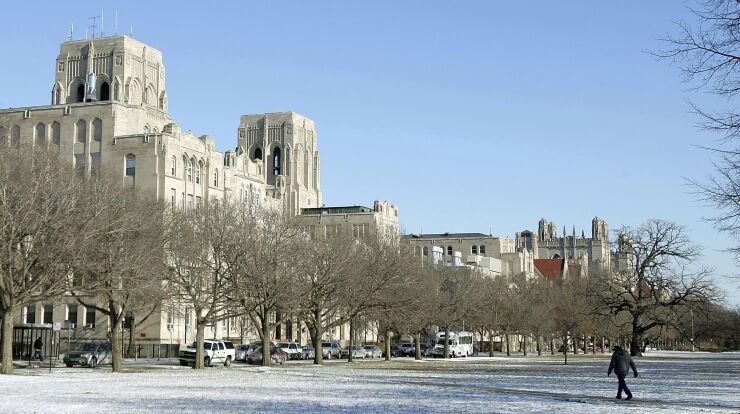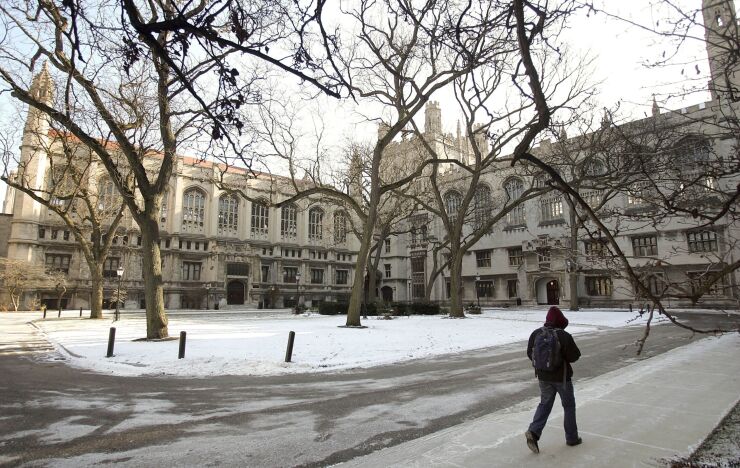There’s a lot more than $10,000 at stake in the University of Chicago Harris School of Public Policy’s 2024 Policy Innovation Challenge, but that’s what the winning team of students will take home, along with a chance to influence decision-making on the Gordian knot of Chicago policy questions: public pensions.
The city currently has $31.8 billion in unfunded pension liabilities, which works out to $11,775 per resident. Rating agencies often point to Chicago’s ability to rein in pensions as a key factor in their view of the city’s credit.
The Policy Innovation Challenge is a “Shark Tank”-style competition in which eight teams set out to tackle Chicago’s pension problem. They have been whittled down to three finalist teams.
Bloomberg News
Next Wednesday, April 3, a panel of five judges will select the winner.
The process, which began in September, included roughly 50 students. Each team was paired with an expert mentor: a municipal finance professional with extensive experience in pensions. Every other week contestants participated in a seminar that included talks by experts and key stakeholders.
Final proposals were due at the end of February and the mentors evaluated the proposals, except the one from the group they’d been assigned to mentor, grading them on four criteria. Political feasibility counted for 30%, salience to the problem counted for 30%, creativity counted for 30% and the presentation itself — which took the form of a short memo — counted for 10%.
“This is an opportunity for students to apply what they’re learning to a very important issue, and to really dig into that issue,” said Harris School Professor Justin Marlowe, director of the school’s Center for Municipal Finance and the faculty lead on the competition. “They have a chance to [draw on] everything they’re learning in our curriculum … because pension issues touch on all those things.”
Another motivation for the project was to give the next generation “an opportunity to sound off on Chicago’s pension problems,” he added. “There’s been discussion about this issue for decades now, but the next generation of taxpayers and municipal leaders haven’t had a say about the problem.”
Omar Daghestani was one of the experts who spoke to the students. As managing director at Stifel, where he leads the top-ranked national pension practice, and treasurer of the City Club of Chicago, Daghestani is well-positioned to advise the next generation on pensions.
“I try to listen as much as I speak, but I did offer that broad brush solutions are not effective and that market participants need to consider each employer’s unique legal, financial and political environment,” he said, noting U.S. public pensions face a funding gap of over $1 trillion.
National Association of State Retirement Administrators Research Director Keith Brainard gave a presentation covering everything from the aggregate funding level of U.S. pensions (75%) to the total number of public retirement systems in Illinois (24, with $200 billion in assets) to the aggregate public pension funding levels since 2001 (the overall trend is one of decline) to the change in median and average investment return assumptions (also a downward-sloping line).
The near-term future looks challenging for public pensions, he told the students, as inflation pressures wages and liability growth, and the slowing rate of new hires pressures contribution rates. Also, with pandemic relief mostly exhausted, muted economic activity and volatility in capital markets will be bigger factors.
The students will do a better job addressing the pension problem than their elders have, for several reasons: “One is that we’re learning,” Brainard said. “We know more now than we knew 20, 40, 60 years ago. And a lot of the problems facing public pension plans are legacy problems. They’re problems that really have their source in plan designs and financing arrangements that were put into place decades ago.”
The students, he said, have had to step back and take stock of constraints like Illinois’ constitutional restrictions on reducing benefits, and the fallout from former Mayor Richard M. Daley’s choice to divert money from pensions to education, which “really dug a hole for the pension plans” in the city.
“It’s a smart bunch, and they seemed very engaged and interested in solving the problem,” he said.

Bloomberg News
The students have clearly drawn some lessons from the challenge already. For one: “There are no silver bullets,” said Syed Ahmad, a team leader for one of the three finalist groups. “A problem of this magnitude requires multiple solutions, each of which chips away at some portion of the problem.”
Ahmad’s group subdivided pension funds into three component parts, and, he said, “the problem for Chicago at this stage primarily lies in funding, with limited areas for improvement on growth or liabilities.” But new sources of funding are tough to come by; Chicago is among the top five cities in the country for property tax rates and ranks number two in sales tax.
His team proposed nine policies, most of them targeting the funding component of the problem. Among other things, they want to securitize a tax revenue stream, such as income taxes; revamp collection processes for outstanding fees; raise police and firefighter funds’ employee contribution levels; deregulate marijuana licensing; change the process through which vacant lots are sold; tie all annual required contribution assumptions to actuarial recommendations; and, last but perhaps most strikingly, toll Lake Shore Drive.
“Our philosophy heading into the challenge was that there was value in bringing a private-sector lens to a public-sector problem,” Ahmad said. While they found that to be true, they also realized the public sector presented “unique challenges.”
For example, in the private sector, “What the CEO says usually goes,” he noted. “In the public sector, there are a much greater number of stakeholders with veto power, making it much harder to implement new policy.”
Another team, led by Anna Weiss, came away from the exercise with the realization that “after 25 years of avoiding a more assertive funding approach to pensions, the dilemma has become one that impacts the entire city, not just pension beneficiaries. Chicago’s credit rating has suffered and the city budget must prioritize pension funding.”
What the city needs is “a sustainable funding mechanism,” said her teammate Devyanshi Dubey. “In order to ensure there are no funding shortfalls, it is critical to have funding reforms, [new] investment strategies and effective governance.”
Their team would require annual advance payments by state law and create a 1% income tax on Chicago residents to “augment the corporate fund for larger supplemental payments”, Weiss said.
The pension problem “has gone unaddressed for a long time, but … I was actually glad to see how the city is determined to solve the pension crisis,” said their teammate Purva Sarkango. “Not only from an actuarial lens, but from a holistic perspective, which involves understanding the problem and looking at what has worked in other states and countries.”
Weiss added, it is “quite humbling seeing firsthand what public policy professionals must address,” but “challenge begets growth.”
Andy Fan, who leads another team of finalists, said he and his teammates reached the conclusion that the pension burden “is strangling the city’s budget, affecting its medium-term solvency and directly affecting the citizens’ ability to receive good quality services.”
Their team proposed an ambitious information campaign. “We hope that having a better-informed population will increase the viability of funding the pension deficit, through rebalancing of key taxes [i.e. income, property and sales] and ultimately pass state-level taxation such as progressive income taxes that allow the city to increase its revenue sources to solve the issue,” he said.
The team is right to identify public opinion as a major obstacle. Gov. JB Pritzker tried and failed to pass a progressive income tax in Illinois through a 2020 referendum. That plan united the editorial boards of the Chicago area’s largest newspapers, except
Fan said this challenge has shown his team “the importance of political accountability.”
“This overwhelming problem Chicago now faces is primarily the result of perverse or non-aligned incentives and small mistakes compounding over time,” he said. “Good policy shouldn’t just address the current needs of a population, but should also be forward-looking and proactive in addressing future complications.”
Speaking of the future, the challenge has already sparked some intriguing conversations outside the classroom. Marlowe said one key stakeholder has reached out to a finalist group and wants to hear more about their proposal.
“We saw lots of different kinds of ideas proposed in those [earlier] eight memos,” he said. “Some of those groups were very interested in pension obligation bonds. You could say now is potentially a really good time to do pension obligation bonds. So, there are a couple groups that saw a financial solution … Something else that has been discussed before is the notion of trying to leverage Chicago’s assets … to really try to put the publicly owned assets to better use.”
The students have also floated some ideas that have never been tried, Marlowe said. “There are a couple groups that are talking about some things that seem really creative.”
Next week, the students will find out who takes home the prize money, but they arguably already received the bigger prize — the opportunity to try their hands at policymaking.
“It’s hard work, it’s really difficult engaging everyone,” Marlowe said. “But one of the things I was really inspired by is, as the students got into this issue, their attitude was: this is a really big, tough issue. Everyone’s going to have to do their part. And it’s going to require different sorts of political coalitions than we’ve maybe seen in Chicago before. So, the students don’t really have a lot of patience for the argument that this group didn’t help get me elected, I don’t have to do anything for them.”
The students have managed to impress not only their professors, but also the experts who’ve helped them along the way. Stifel’s Daghestani suggested local policy wonks would be wise to pay attention to this contest.
“The Center for Municipal Finance at the Harris School is the preeminent public finance program in the nation, and I really like the students I have gotten to know over the past year,” Daghestani said. “Hire them, mentor them; they will be our bosses one day soon.”
The event will be livestreamed on the Harris School’s website. Viewers will
